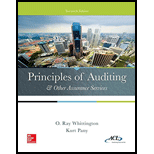
Principles of Auditing & Other Assurance Services (Irwin Accounting)
20th Edition
ISBN: 9780077729141
Author: Ray Whittington, Kurt Pany
Publisher: McGraw-Hill Education
expand_more
expand_more
format_list_bulleted
Question
Chapter 4, Problem 28KOQ
To determine
Identify the most significant result of the Continental Vending case.
Expert Solution & Answer
Want to see the full answer?
Check out a sample textbook solution
Students have asked these similar questions
Can you explain the correct approach to solve this general accounting question?
The following information describe a company's usage of direct labor in a recent period
Calculate the cost of raw materials used.
Chapter 4 Solutions
Principles of Auditing & Other Assurance Services (Irwin Accounting)
Ch. 4 - Prob. 1RQCh. 4 - Prob. 2RQCh. 4 - Prob. 3RQCh. 4 - Prob. 4RQCh. 4 - Prob. 5RQCh. 4 - Prob. 6RQCh. 4 - Prob. 7RQCh. 4 - Prob. 8RQCh. 4 - Prob. 9RQCh. 4 - Prob. 10RQ
Ch. 4 - Prob. 11RQCh. 4 - Prob. 12RQCh. 4 - Prob. 13RQCh. 4 - Prob. 14RQCh. 4 - Prob. 15RQCh. 4 - Prob. 16RQCh. 4 - Prob. 17RQCh. 4 - Prob. 18RQCh. 4 - Prob. 19RQCh. 4 - Prob. 20QRACh. 4 - Prob. 21QRACh. 4 - Prob. 22QRACh. 4 - Prob. 23QRACh. 4 - Prob. 24QRACh. 4 - Prob. 25QRACh. 4 - Prob. 26QRACh. 4 - Gordon Moore, CPAs, were the auditors of Fox ...Ch. 4 - Prob. 28AOQCh. 4 - Prob. 28BOQCh. 4 - Prob. 28COQCh. 4 - Prob. 28DOQCh. 4 - Prob. 28EOQCh. 4 - Prob. 28FOQCh. 4 - Prob. 28GOQCh. 4 - Prob. 28HOQCh. 4 - Prob. 28IOQCh. 4 - Prob. 28JOQCh. 4 - Prob. 28KOQCh. 4 - Prob. 28LOQCh. 4 - Prob. 29OQCh. 4 - Prob. 30OQCh. 4 - Match the important cases listed below with the...Ch. 4 - Prob. 32OQCh. 4 - Prob. 33OQCh. 4 - Prob. 34PCh. 4 - Prob. 35PCh. 4 - Prob. 36PCh. 4 - Charles Worthington, the founding and senior...Ch. 4 - Prob. 38PCh. 4 - Prob. 39PCh. 4 - Prob. 40PCh. 4 - Prob. 41ITCCh. 4 - Prob. 42RDC
Knowledge Booster
Similar questions
arrow_back_ios
SEE MORE QUESTIONS
arrow_forward_ios
Recommended textbooks for you
 Auditing: A Risk Based-Approach (MindTap Course L...AccountingISBN:9781337619455Author:Karla M Johnstone, Audrey A. Gramling, Larry E. RittenbergPublisher:Cengage Learning
Auditing: A Risk Based-Approach (MindTap Course L...AccountingISBN:9781337619455Author:Karla M Johnstone, Audrey A. Gramling, Larry E. RittenbergPublisher:Cengage Learning Auditing: A Risk Based-Approach to Conducting a Q...AccountingISBN:9781305080577Author:Karla M Johnstone, Audrey A. Gramling, Larry E. RittenbergPublisher:South-Western College Pub
Auditing: A Risk Based-Approach to Conducting a Q...AccountingISBN:9781305080577Author:Karla M Johnstone, Audrey A. Gramling, Larry E. RittenbergPublisher:South-Western College Pub


Auditing: A Risk Based-Approach (MindTap Course L...
Accounting
ISBN:9781337619455
Author:Karla M Johnstone, Audrey A. Gramling, Larry E. Rittenberg
Publisher:Cengage Learning

Auditing: A Risk Based-Approach to Conducting a Q...
Accounting
ISBN:9781305080577
Author:Karla M Johnstone, Audrey A. Gramling, Larry E. Rittenberg
Publisher:South-Western College Pub